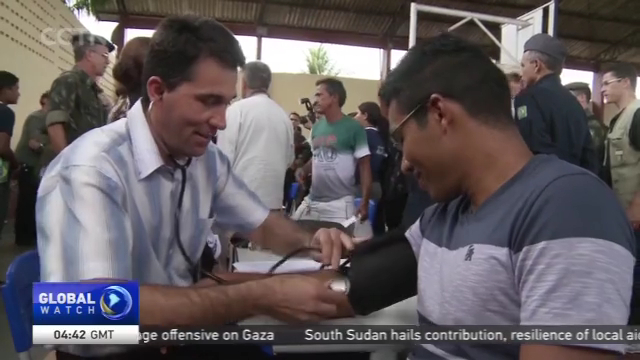
13:50, 17-Nov-2018
Cuban Doctors in Brazil: Cuba ends program after 'threatening' comments from Bolsonaro
Updated
12:55, 20-Nov-2018
02:19

Cuba is ending a program that provides thousands of doctors to rural Brazil. That announcement came after Brazil's incoming president, Jair Bolsonaro, called the program "slave labor". The move will leave many Brazilians in rural areas without a doctor. And it will also cut some badly-needed income for the Cuban government. CGTN's Stephen Gibbs has the details.
Since 2013, thousands of Cuban doctors have been working in Brazil. They are often based in remote rural areas, where it has been hard to recruit Brazilian medical staff. They provide care to patients, some of whom previously had no access to a doctor. But Brazil's incoming right-wing president, Jair Bolsonaro, has been critical of the project, which he says is exploitative of the doctors. Most of their monthly wage is retained by the Cuban government; and they are prohibited - by Cuba - from bringing their families with them.
JAIR BOLSONARO BRAZIL PRESIDENT-ELECT "I would never make a deal with Cuba on those terms. This is slave labour. It is slave work. I could not be an accomplice to this. I am a democrat."
The Cuban government says such comments are unacceptable, and it will be ending the program next year. That presents a logistical problem, as Brazil's incoming Vice President told me during an interview in Brasilia.
ANTONIO HAMILTON MOURAO BRAZIL VICE PRESIDENT-ELECT "If they are going to go back to Cuba, it is going to be almost a military operation to take them back. I know that these people are deployed inside Brazil, in the hinterland of Brazil, so we have to substitute them because they play a good role in those small towns where they are deployed. So we have to make a new arrangement. It will be a good test for our government."
The end of the program will have a social cost for Brazil, and a financial one for Cuba - one of its most significant exports is medical services. And, it is a reminder that change is afoot here, as Brazil's incoming government reviews all existing cooperation programs, particularly those with its leftist neighbours. Stephen Gibbs, CGTN, Brasilia.

SITEMAP
Copyright © 2018 CGTN. Beijing ICP prepared NO.16065310-3
Copyright © 2018 CGTN. Beijing ICP prepared NO.16065310-3